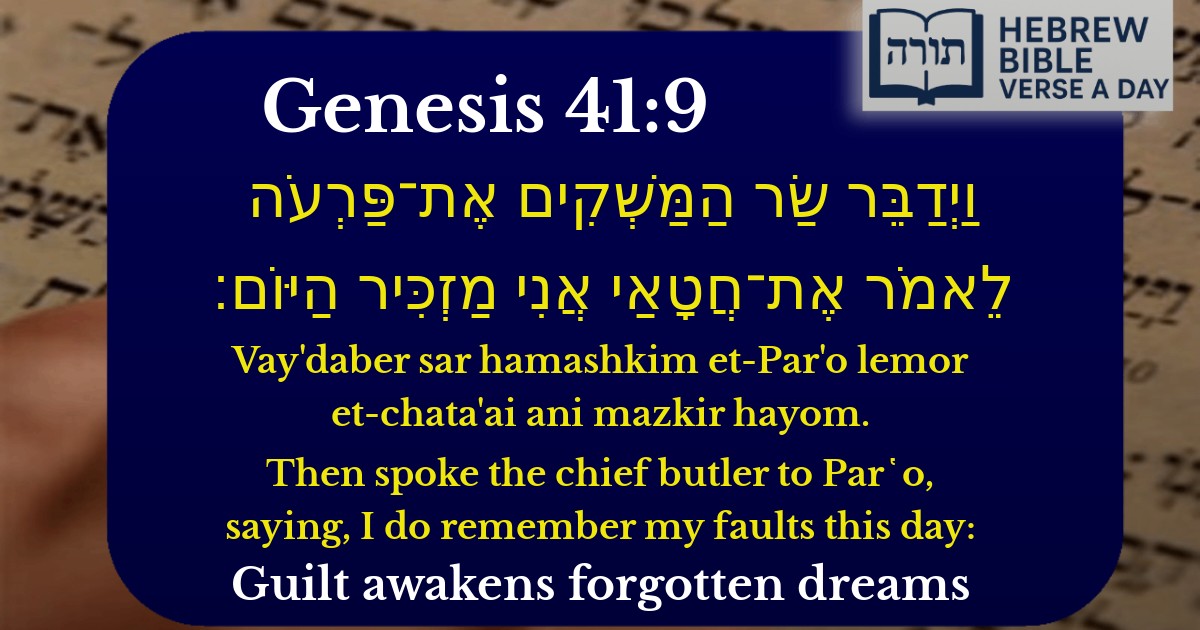Join Our Newsletter To Be Informed When New Videos Are Posted
Join the thousands of fellow Studends who rely on our videos to learn how to read the bible in Hebrew for free!
Hebrew Text
וַיְדַבֵּר שַׂר הַמַּשְׁקִים אֶת־פַּרְעֹה לֵאמֹר אֶת־חֲטָאַי אֲנִי מַזְכִּיר הַיּוֹם׃
English Translation
Then spoke the chief butler to Par῾o, saying, I do remember my faults this day:
Transliteration
Vay'daber sar hamashkim et-Par'o lemor et-chata'ai ani mazkir hayom.
Hebrew Leining Text
וַיְדַבֵּר֙ שַׂ֣ר הַמַּשְׁקִ֔ים אֶת־פַּרְעֹ֖ה לֵאמֹ֑ר אֶת־חֲטָאַ֕י אֲנִ֖י מַזְכִּ֥יר הַיּֽוֹם׃
וַיְדַבֵּר֙ שַׂ֣ר הַמַּשְׁקִ֔ים אֶת־פַּרְעֹ֖ה לֵאמֹ֑ר אֶת־חֲטָאַ֕י אֲנִ֖י מַזְכִּ֥יר הַיּֽוֹם׃
🎵 Listen to leining
Parasha Commentary
📚 Talmud Citations
This verse is not quoted in the Talmud.


Context in the Narrative
This verse (Bereshit 41:9) occurs when the chief butler (שר המשקים) finally remembers Yosef after two years, when Pharaoh is troubled by his dreams. The butler acknowledges his earlier failure to mention Yosef's dream-interpreting abilities when he was restored to his position (Bereshit 40:14-15, 23).
Rashi's Explanation
Rashi comments on the phrase "את חטאי אני מזכיר היום" ("I do remember my faults this day"), explaining that the chief butler is admitting his negligence in not advocating for Yosef sooner. He emphasizes that the butler is confessing his wrongdoing only now, when it becomes relevant to Pharaoh's need for a dream interpreter.
Midrashic Insight
The Midrash (Bereshit Rabbah 89:7) elaborates that the chief butler was punished with two additional years in prison (beyond the initial interpretation of his dream) because he failed to fulfill his promise to Yosef. This verse reflects his belated recognition of his moral failing—only when prompted by Pharaoh's distress does he recall his obligation.
Moral Lesson from Rambam
Rambam (Hilchot Teshuva 2:1) teaches that true repentance requires acknowledging one's sin when placed in the same situation again. The chief butler's delayed admission highlights the importance of timely repentance—had he acted sooner, Yosef’s suffering might have been shortened.
Chassidic Perspective (Sefat Emet)
The Sefat Emet notes that the phrase "היום" ("this day") suggests a moment of divine providence. The butler’s memory was awakened precisely when needed to set in motion Yosef’s rise to power, demonstrating how Hashem orchestrates events for the ultimate redemption of the righteous.
Key Takeaways